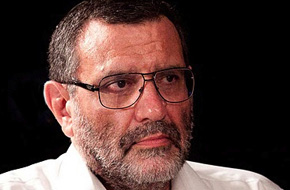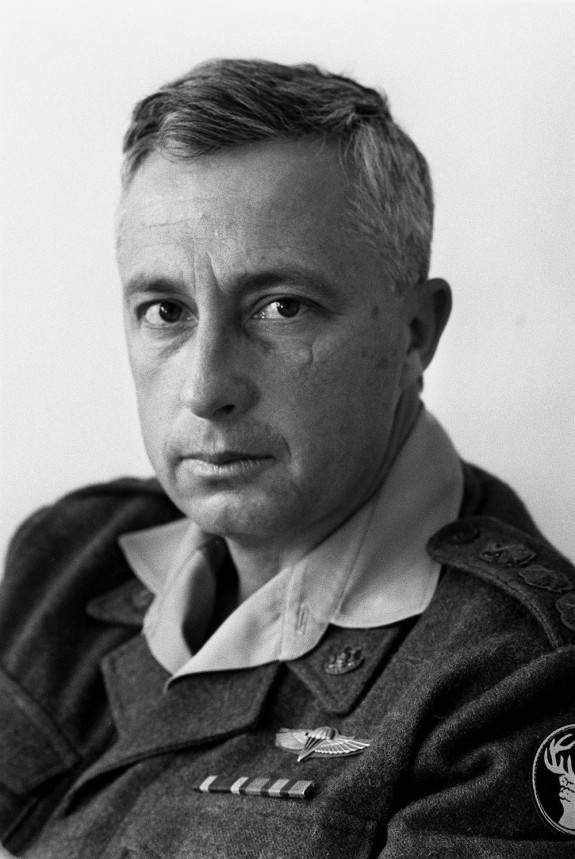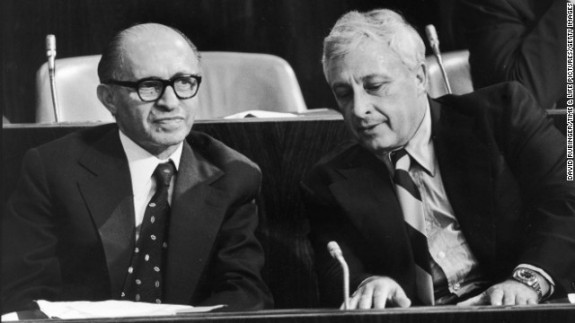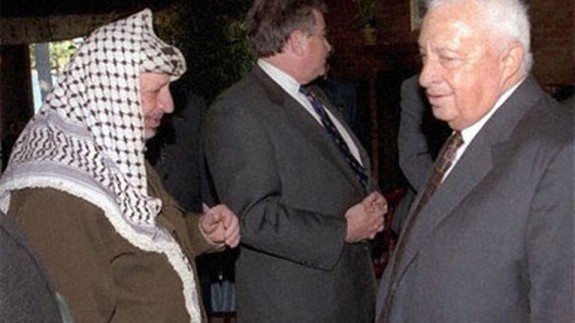David Landau’s biography of the late Ariel (Arik) Sharon could not have been better timed. I received Arik: The Life of Ariel Sharon (Alfred A. Knopf), by Israeli journalist David Landau, a few days before his death on Jan. 11. It’s a massive book, running to more than 500 pages, and it’s well worth reading.

Landau, who honed his considerable skills at The Jerusalem Post and Haaretz, is currently the Israel correspondent for The Economist. He knows his stuff and it shines through in Arik, which is fastidiously researched and felicitously written and stands a good chance of becoming the definitive work on one of Israel’s most controversial figures.
Landau culls much of his material from secondary sources, but a fair chunk of it is based on interviews. Landau talked to Sharon’s friends and foes, as well as to such outsiders as William Brown, the former U.S. ambassador to Israel, but he did not interview Sharon himself. “I wish I’d had the journalistic good sense to spend more time talking to him,” he writes.
Input from Sharon would have been of immeasurable help, but such are Landau’s skills as a researcher and writer that Arik stands tall without it.
This is a chronological work. It begins with his birth in Kfar Malal, a farming village in central Israel that inculcated in him a love of the land, and ends with the life-shattering stroke that sent him into an eight-year coma from which he never awoke.

Sharon’s parents, Samuil and Vera Scheinerman, arrived in Palestine almost a century ago. Their son was raised in an intense Zionist atmosphere and amid rising tension between Jews and Arabs.
During the 1948 War of Independence, Sharon was nearly killed at the battle for Latrun. Smart, cocky and arrogant, Sharon was placed in charge of a post-war special unit whose task it was to carry out reprisal raids against neighboring Arab states. “Sharon’s military prowess, tactical skills and leadership gifts contributed significantly to the unit’s success,” Landau says.
Israel’s prime minister, David Ben-Gurion, admired Sharon for his bravery and resourcefulness and regarded him as the antithesis of the galuti, or Diaspora Jew. But due to a botched operation during the 1956 Sinai war, and his propensity to bend the truth when it suited his purposes, Sharon’s lustre was somewhat tarnished.
After a stint as commander of the army’s infantry school, a period he described as his “exile in the wilderness,” Sharon was appointed deputy commander of the Northern front, where he focused his energies on Syria. Syrian attempts to divert the waters of the Jordan River resulted in sporadic clashes with Israel that rattled the Middle East.
On the eve of the 1967 Six Day War, he was appointed director of military training and commander of a reserve division. “As head of training, Sharon was certainly entitled to share in the credit for that amazing victory,” Landau notes.
In 1971, he played a key role in eradicating terrorism in the Gaza Strip, but his draconian methods were criticized.
Sharon’s performance in the Six Day War was remarkable. An excellent field commander, he distinguished himself in the conquest of the Abu Agheila fortifications, a victory that contributed to Israel’s conquest of the Sinai Peninsula in less than a week.
As soon as he heard that the West Bank had been captured, Sharon ordered the infantry school to be moved from Netanya to a Jordanian army camp near Nablus. At Sharon’s behest, more military training schools were transferred to the West Bank. Sharon subscribed to the Allon Plan, which held that Israel should keep the Jordan Valley, the area around Jerusalem and a strip running along narrow sections of the pre-1967 border.

Despite his proclivity for bending or ignoring orders, Sharon was given command of the Southern Command, which was responsible for securing the southern two-thirds of Israel. Like the Israeli elite, Sharon was confident of Israel’s strength and certain that Egypt would be incapable of launching an attack for years to come.
He was disabused of that complacent conceptziya when the Egyptian armed forces fired the first shots of the 1973 Yom Kippur War and landed troops on the Israeli-held side of the Suez Canal. Sharon redeemed himself when he turned the tide of the war, leading an armoured division across the Suez Canal into Africa, where Egypt’s Third Army was surrounded.
Not content only to promote himself, Sharon denigrated the competency of some of his fellow generals, touching off the so-called “war of the generals” and earning the enmity of senior commanders.

Forced out of the army, Sharon, a right-winger, turned his talents to politics and formed Shlomzion, a political party. Elected to the Knesset, he later joined the Likud party, whose leader, Menachem Begin, appointed him to the cabinet as minister of agriculture. He would hold many more portfolios in the years ahead, but in his first ministerial job, he multiplied the number of settlements beyond the Old Green Line.
Moshe Dayan, his colleague and former superior, feared that Sharon would embroil Israel in a war in Lebanon. Sharon, then the minister of defence, was not the cause of that war, but his aggressive posture toward the PLO and Syria embroiled Israel in a far greater conflict than Begin had imagined. Israel pushed the PLO out of southern Lebanon, a significant achievement, but failed to impose a peace treaty on the Lebanese government. Landau’s comments on this failure are particularly illuminating.
Israel’s invasion of West Beirut, plus Sharon’s tolerance of a Phalange massacre of Palestinians in the Sabra and Shatila refugee camps, proved to be very problematic for the Israeli government and Sharon himself. Stung by the accusation that he was personally responsible for allowing the Phalange to run amok, Sharon was forced to resign as defence minister.
Bouncing back as minister of commerce and housing, Sharon helped ensure that settlements in the occupied territories would thrive. Under his watch, settlements grew by leaps and bounds, frustrating U.S. peacemaking efforts. At one point, he went as far as to demand the annexation of sparsely populated areas of the West Bank.
During the 1991 Gulf War, Sharon urged Yitzhak Shamir, the Israeli prime minister, to silence Iraq’s Scud launchers, which had wreaked havoc on Israel in the first days of the war. But Shamir, a hawk himself, demurred in deference to the United States.
After the war, when the U.S. secretary of state, James Baker, tried to lay the groundwork for a Mideast peace conference, Sharon tried to sabotage his shuttle diplomacy by announcing the birth of a new settlement each time he visited Israel.
To one one’s surprise, Sharon was a fierce opponent of the Oslo peace process, so much so that he branded Yitzhak Rabin, the prime minister, an Arab collaborator.
As foreign minister, Sharon was pretty much of a loose cannon too, calling on Jewish settlers to seize hill sides in the West Bank so that Israel could claim them. But after defeating Ehud Barak in an election and succeeding him as prime minister in 2001, Landau points out, Sharon altered his views. “Sharon’s transformation during this period from man of war to man of peace was neither complete nor consistent,” he writes.
But now, with the second Palestinian uprising in full swing, Sharon recognized that he could no longer oppose a two-state solution and that Israel’s occupation of the Gaza Strip was untenable. “The hope of peace for us Israelis lies in the principle of separation between the Palestinians and ourselves,” he said, adding that Israel’s continued presence in Gaza posed “a mortal danger” to Israelis and to Israel’s “very essence as a Jewish and a democratic state.”
Landau, probably correctly, rejects the thesis that Sharon’s visit to the Temple Mount in Jerusalem touched off the second Palestinian intifada in 13 years. His visit, while provocative, prompted the leader of the Palestinian Authority, Yasser Arafat, to launch pre-planned violence.

Landau claims that Israel’s 2005 unilateral withdrawal from Gaza, for all its flaws and limitations, was “a monumental change of direction for Israel.” He adds, “Sharon spent long years building the settlements and abetting the settlers in their drive to impose the Jewish state on its Palestinian neighbors. Then, very late, he understood what this hubristic policy endangered: the very survival of Israel as a Jewish and democratic state.”
The pullout from Gaza, while important, is not the only legacy Sharon left behind. If Israel and the Palestinians ever make peace, Israel’s withdrawal from Gaza will be seen as one of the sign posts along the road to reconciliation and peace.
